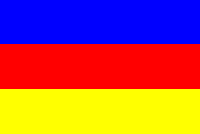Great Ideological Conflict
| Great Ideological Conflict | ||||||||
|---|---|---|---|---|---|---|---|---|
 | ||||||||
| ||||||||
| Belligerents | ||||||||
|
Left-Wing Nations |
Conservative Nations and Parties
|
Istoria | ||||||
| Commanders and leaders | ||||||||
|
Major Left-Wing Leaders |
Major Right-Wing Leaders |
Istorian Leaders | ||||||
The Great Ideological Conflict was a 2010 intermicronational conflict consisting of various small conflicts between left and right wing elements within the MicroWiki Community. Ideological conflicts have long dominated the intermicronational space, with micronations often carrying the flag for underrepresented and sometimes radical movements within the macro world.
Although ideology has influenced other micronational strife and wars, in the mid 2010 period these divides became the central driving force behind activity in the community. This ideological conflict cross-contaminated with other battles between Simulationism and Secessionism to generate a pressure cooker for intermicronational incidents. Like the macronational Cold War between the United States and the Soviet Union, the conflict involved little direct confrontation and was made up of a number of smaller conflagrations. Much of these were low-level wars of words conducted on MicroWiki talk pages.
Background
Both prior to the Great Idelogical Conflict and long after, political disagreements have factionalized the MicroWiki community. Contributing to the rise of the Great Idelogical Conflict, however, was a power imbalance between different parts of the community. A largely, though not entirely, left and center-left faction comprised of many wiki admins, older and more "serious" micronations. A group of younger, largely conservative and libertarian micronationalists who were new to the wiki in late 2009 and early 2010 began increasing their activity. These younger nations were lead by figures like Bradley of Wyvern, Parker I of Sterling and Secundomia, and Nicholas Woode-Smith of the Zonian Confederacy.

The communication and political styles of these younger micronationalists were often more aggressive, simulationist and immature. This resulted in friction between the two groups. At first, the friction was more based in style, with nations like Sandus and St. Charlie condemning the rash behavior of the younger nations during the Austenasian Civil War.[1] After the war, tensions still existed and politics became the new arena for this conflict.
Synopsis
Sandum-ICA Conflict
The Sandum-ICA Conflict opened up the Great Ideological Conflict. It consisted of a flame-war and dispute between the Intermicronational Conservative Alliance (ICA), an anti-Communist and Conservative organisation, and the People's Democratic Republic of Sandus, a Communist nation.[2] It began with the founding of the ICA on 18 May 2010 with a platform that meant to "fight Socialism and Communism". Gaius Soergel Publicola responded 8 days later with an address to the State of Sandus on its day of independence.[3]
Although Soergel initially clarified that Sandus did not want war in his address to the state, one day later the Citizens' Communist Party of Sandus claimed said it would wage "ideological warfare" against Secundomia, Wyvern, and New Europe among others as that is what the ICA had done against the DPRS, as the Chairman of the Revolutionary Council explained.[4][5] The ICA took this as an attack on their membership, as the Secundomian Conservative Party and Conservative-Liberal Party were both ICA members.[6]


ICA argued that Sandus was attacking certain states because they had ICA political parties. Sandus claimed that this was false and threatened further to withdraw recognition of Wyvern over Dullahan's statements. King Quentin I rejected this ultimatum and criticized Sandus for violating the OAM charter.[7] The leader of the New European Leftist Party contacted the Chairman and they both swore to political cooperation. This fight fizzled out when Bradley of Dullahan resigned his position in the ICA. He claimed he couldn't handle the stress from the media attacks on him by others in the Wyvern government and Sandus. The position of Secretary-General passed to Parker I. Bradley offered to help Parker where needed. Parker I altered the stance of the ICA to a less aggressive one in order to prevent this kind of conflicts from happening again. Parker later reversed his opinions on communism and became a leader of the Worker's Party of Secundomia in 2015.
Eleytheria
The king of Eleytheria wrote and published a controversial document in the May of 2010. The document analyzed communism. It incited the reactions of many people, due to its bias against communism. Further, the King was accused of being a sockpuppet of banned micronationalist Mark Dresner (who himself was a pseudonym of Sebastian Linden). The King was banned from MicroWiki but had his ban reversed after protest. Support for the King's innocence often broke along ideological lines. Eventually Linden admitted the King was a fabricated persona.
Erusia
This article contains information pertaining to a fictional micronation, micronationalist or other fictional element of micronational society or culture. |

Erusia was a fictional communist micronation closely tied to Sandus.[2] All the internal workings of the country were fabricated by Robert Lethler. At the time of the Great Ideological Conflict, most nations in the community believed Lethler's claims. Lethler reported significant internal strife within the one-man nation along ideological lines. These false claims, perceived as true by the intermicronational community, had a real and significant impact on the course of the broader conflict.
Erusian-ICA Crisis
When Lethler claimed Erusian officials arrested members of the ICA, at that time - the ICA was alleged to not be registered with the Central People's Government of Erusia. The Erusian-ICA Crisis soon arose with supporters of both sides growing. The Erusian-ICA Crisis was caused by bad communication and the ICA not being aware of the rule to registration, this also ended after a talk between Bradley and the Premier of Erusia. The Lethlergate scandal, however, later revealed the arrest of ICA members to be entirely simulated and fictional: the members subject to arrest never existed in the first place.
Istoria-Erusian War

The Kingdom of Istoria declared war on Erusia in June 2010. The king stated his reasons as, "a), I'm anti-communist, & b), I really, really need money." Several micronations, including Petorio, have heavily condemned Istoria's actions, and Istoria's international relations since declined. Erusia did not recognize the war. The ICA was not involved in this conflict and ICA Secretary-General Parker I condemned the conflict on behalf of Secundomia and Sterling.
Erusian Operation Luxemburg & Civil War
Like the Erusian-ICA Crisis, the Erusian Civil war was a simulated element of the Great Ideological Conflict conducted by Robert Lethler. The following is a fictional account that was provided to the MicroWiki Community as fact.
Following the election of the Democratic Party of Erusia to power in Erusia's June Elections, it came to light that some members of the opposition party, the National Unity Party, may authorize Operation Luxemburg. Operation Luxemburg, legalized by the Proletarian Protection Act 2009, authorized the People's National Liberation Army from capturing and taking authority from the Central People's Government and establishing a provisional government over the course of no more than three months. Over the days following the election, the Operation was authorized by the National Unity Party and used against the elected Democratic Government. Robert Lethler faced priority on the PNLA's most wanted and was issued warrants for his arrest. Other members of the National Unity Party sided with the elected government and the judicial system of Erusia, generally National Unity Party controlled, found the Operation to be illegal. The elected prime minister Katrina Walters, too, stated she would oppose the Operation and plunged the nation into civil war.
Upon the revelations that Lethler had masterminded the whole conflict, the nation of Erusia collapsed and left the Great Ideological Conflict, leaving the MicroWiki Community as a whole behind as well.
References
- ↑ Secundomian Concerns of Order 070710 | Austenasium Civilum et Guerrus Guillaume Soergel, Mar 19, 2010
- ↑ 2.0 2.1 sandus.org - Our History
- ↑ Sandus - Address to the State - May 26 Micro Commons
- ↑ Veritum Sandus - Anti-Sandum policies of Other States 27 May 2010
- ↑ St Charlian Observer - Eat At Nicks: Carolinians and Conservatives 26 May 2010
- ↑ Secundomia (Parker I) talk page discussion 25 May, 2010.
- ↑ King Quentin I of Wyvern's reaction to the ultimatum posed by the Sandus Government
